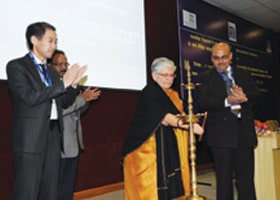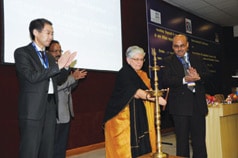
 Vocational Education and Training (VET) is recognized as an important aspect of the nation’s educational initiatives. In order of the VE to play its part effectively in the changing global environment, there is an urgent need to redefine the critical elements of imparting VET to make them relevant, flexible, and sustainable to suit the contemporary needs of the learner and industry. In this backdrop, the NIOS, UNESCO and COL planned a three day International Conference on “Integration of Academic Courses with Vocational Education in Secondary Schools” from 17-19 February 2012 at IDSA, New Delhi. The Conference deliberated upon the impending challenges and issues in the academic courses at secondary education level and tried to develop a framework and recommendations to establish linkages of skills training through vocational education at secondary school level with emphasis on knowledge base through academic subjects.
Vocational Education and Training (VET) is recognized as an important aspect of the nation’s educational initiatives. In order of the VE to play its part effectively in the changing global environment, there is an urgent need to redefine the critical elements of imparting VET to make them relevant, flexible, and sustainable to suit the contemporary needs of the learner and industry. In this backdrop, the NIOS, UNESCO and COL planned a three day International Conference on “Integration of Academic Courses with Vocational Education in Secondary Schools” from 17-19 February 2012 at IDSA, New Delhi. The Conference deliberated upon the impending challenges and issues in the academic courses at secondary education level and tried to develop a framework and recommendations to establish linkages of skills training through vocational education at secondary school level with emphasis on knowledge base through academic subjects.
The objectives of the conference were to:
1. Explore the modalities for increasing the access to sustainable and learner centric quality school education equipped with vocational skills;
2. Develop strategic plan to strengthen the environment and image of VET; and
3. Establish linkages on the quality assurance system for the VET to promote the quality and equity among learners at all levels.
PARTICIPANTS
Experts from Australia, Bangladesh, Fiji, India, Germany, Namibia, New Zealand, Malawi, Tranzania and Zamibia. Representatives from Academic Institutions, Trade and Industry Associations, Federation of Indian Chambers of Commerce and Industry (FICCI), Conference of Indian Industries (CII), Vocational Education Institutes, Educational planners and administrators and international experts in vocational, secondary and open learning participated in this conference.
THEMES
The various sessions of the Conference centred on the sub-themes of:
• Vocational skills and training to empower citizens;
• Designing the curriculum and quality framework to strengthen the impact of vocational courses,
• Use of technology in providing education;
• Developing framework for the Recognition of Prior Learning; and
• Development of Assessment and Certification Framework.
Organizers received 90 abstracts from the national and international experts, out of which 45 were shortlisted and presented in different parallel sessions.
INAUGURAL
The Conference was inaugurated by Ms Anshu Vaish, Secretary, School Education, MHRD, Government of India. There was a special address by Shigeru Aoyagi, Director, and UNESCO Representative to Bhutan, Maldives, India and Srilanka.
There were five thematic sessions, two panel discussions besides the parallel sessions on all the three days.
The first theme for the plenary session on 17th February was on the “Use of Technology in Providing Education”. The speaker on the theme was Prof. Sugata Mitra, MIT Media Lab, USA. Prof. Mitra shared his experience with the experiments that he had done with the use of IT and search engines in educating children.
 He presented the “Hole in the wall” experiment and emphasized on the need for self organized learning environment. He also showed the interesting results of various experiments which were conducted in several contries where he showed that there is a uniform learning curve when the children learn without any assistance. Children, when given free access to computers, pick up basic computer literacy skills by with minimal intervention by adults. This has been called Minimally Invasive Education (MIE) by Dr. Sugata Mitra and is basis for the Hole-in-the-Wall Learning Stations.
He presented the “Hole in the wall” experiment and emphasized on the need for self organized learning environment. He also showed the interesting results of various experiments which were conducted in several contries where he showed that there is a uniform learning curve when the children learn without any assistance. Children, when given free access to computers, pick up basic computer literacy skills by with minimal intervention by adults. This has been called Minimally Invasive Education (MIE) by Dr. Sugata Mitra and is basis for the Hole-in-the-Wall Learning Stations.
The second theme was on Vocational Skills and Training to empower citizens. The two speakers Sharda Prasad, Joint Secretary & Director General (DGET), Ministry of Labour, Govt. of India and Mr. G. Vaz, International Development Consultant. Mr. Prasad presented an overview of the strategies being adopted to bring about necessary changes in vocational training imparted in ITIs.
Vaz highlighted the need to change the mindset and perception of the public towards VET and discussed the importance of knowledge, skills, and innovations which are essential for a country to succeed.
Third theme was shared on second day “Designing the Curriculum and Quality Framework to Strengthen the Impact of Vocational Education at school Level.
Dilip Chenoy and Basab Banerjee from (National Skills Development Council) NSDC presented the role that the organization is playing in development and implementation of National Vocational Education Qualification Framework (NVEQF). Chenoy emphasized that multi-skilling should be done to enhance the employability or rural youth. They also highlighted the role of the Industry in mapping of skills and curriculum development.
Belinda Smith, Consultant, TVET, Australia highlighted the need to adopt ways of integrating vocational skills by using ICT and simulated learning environment. The fourth theme was on Developing Framework for the Recognition of Prior Learning, which addressed the issues of identification of informal knowledge and skills and attaching importance to it. In this session there were two very distinguished speakers Ms. Liz Bowen from Competency International Ltd., New Zealand and Ms Madhu Singh From UNESCO Institute of Lifelong learning (UIL) Germany. Ms Liz began with a motivating presentation and mentioned that lack of formal qualification does not mean that someone is not competent. Ms Madhu Singh from UIL dwelt upon the need for policy and guidelines for the RPL and different approaches to governance of PRL.
The session was followed by a panel discussion on Vocational Education in Secondary Schools and its implications for NVEQF. Dr Alka Bhargava, from MHRD, Dr Swati Majumdar, Director, Symbioses Institute of open learning , Pune, Inder Gahlaut, President, Saksham Bharat, Darshika Sanghani from Wadhwani foundation were the panelist and Dr Kuldeep Agarwal director academics NIOS was the moderator.
The fifth and the last theme of the conference was on the Assessment and certification framework. The theme addressed the issues pertaining to development of framework in an integrated situation for both academic and vocational subjects, credit transfer and assessing skills by educational institutions in partnership with industries. The two speakers for this sessions were Ms Maria Peters from Australia and Shailender Sigdel Regional Advisor Statistics UNESCO. The topic for the Peter’s presentation was “Working in the partnership to engage young people in VET”. She gave the overview of the Australian education context and the VET policy framework. Sidgel provided details on TVET and its assessment strategies and tools designed by UIS, such as the Literacy Assessment, Product on TVET. His presentation covered the aspects of TVET, its purpose, assessment and types of assessment.
VALEDICTORY SESSION
The Chief Guest of the Valedictory session was Dr. (Smt.) D. Purandeshwari, Hon’ble Minister of State for Human Resource Development, Government of India and Sh. Jagmohan Singh Raju, JS (AE) and DG, NLMA, Government of India was the guest of honour on the occasion. The welcome address and consolidation of three days International Conference was given by Dr. Sitansu S. Jena, Chairman, National Institute of Open Schooling. Dr. Mamta Srivastava, Deputy Director, (Vocational Education) NIOS and conference secretary presented report of the conference. Dr. K.P. Wasnik, Director, (Vocational Education) NIOS presented Vote of Thanks.





















